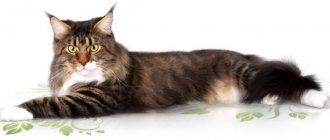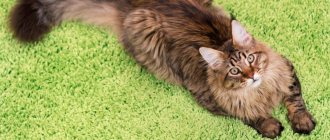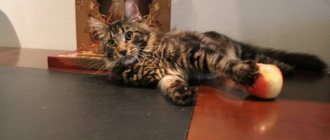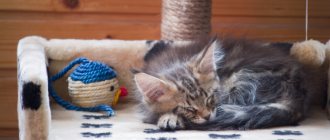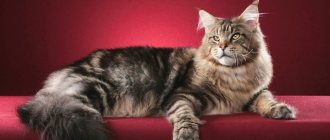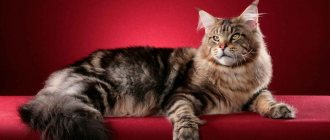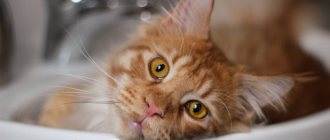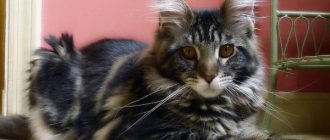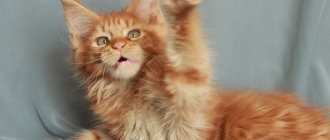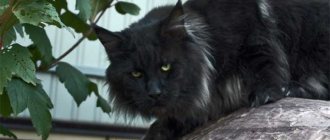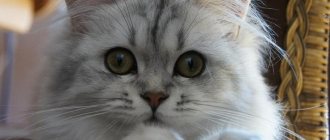The Maine Coon is a cat naturally adapted to harsh climates. Possessing amazing endurance and excellent health, it would seem that she should not cause trouble to veterinarians. And yet, sometimes these tough animals get sick, and only the owner of the animal can notice the disease in time and stop its development.
In animals of this breed, the disease most often affects the muscles and joints. Among the most common diseases of Maine Coons are diseases of the heart, blood vessels and musculoskeletal system.
As a rule, they are passed on to offspring from parents, so cat breeders are obliged to conduct breeding work very scrupulously and not allow animals with questionable heredity to breed. Sudden death in young Maine Coons and kittens is always the result of family “sores”.
Hereditary pathologies are, for the most part, incurable, but by identifying the genes responsible for them using specialized tests, it is possible to prevent the birth of unhealthy babies that will not survive to adulthood.
Incurable hereditary pathologies of Maine Coons include:
- Hypertrophic cardiomyopathy is a hardening of the heart muscle leading to embolism and heart failure. The cause of this disease is a defective gene that controls the synthesis of a protein compound that contributes to the functioning of the heart muscle. A healthy individual can be a carrier of a mutated gene, which is why tests that detect a genetic malfunction are so important in order to prevent its spread in the population.
- Hip dysplasia is not life-threatening, but can cause a lot of suffering to the animal. In this disease, the articular head does not coincide with the socket, which is why the cartilage tissue of the joint is gradually destroyed. A cat suffering from dysplasia has a wobbling gait, jumping and simply rapid movements that cause her pain, and she has frequent paw dislocations. The result of this disease is disability.
- Spinal muscular atrophy is not a fatal disease, but gradually leads to weakness and paralysis. With this disease, the neurons of the spinal cord are affected, and the muscles are gradually destroyed. The cat does not suffer from painful sensations, but it is plagued by constant tremors and involuntary muscle twitching. First, the animal loses stability, and then completely loses the ability to assume a natural, permanent position for any long period of time. Simply put, the cat can neither sit nor stand.
- Polycystic kidney disease is a hereditary anomaly in which healthy kidney tissue gradually degenerates into cysts. Polycystic disease is not characterized by severe symptoms; the onset of the disease is similar to renal failure. This disease is also incurable, but its timely detection can improve the cat’s quality of life and prolong its life.
Other Maine Coon diseases are treatable, but prevention is still preferable.
Typical diseases of Maine Coons
Although the Maine Coon is a fairly healthy and strong breed of cat . They may still have some diseases, which can be grouped into several main groups.
Diseases of the musculoskeletal system
- Purulent arthritis caused by joint injury and bacterial infection entering the wound. The course of the disease is accompanied by pain, fever and limited mobility of the animal.
- Deforming inflammation of the joint. The disease is characterized by excessive growth of bone tissue, disrupting the normal functioning of the joints of the limbs.
- Spinal muscular atrophy is an incurable genetic disease. It is caused by degeneration of spinal cord motor neurons, which leads to muscle atrophy.
- Hip dysplasia is another serious condition for Maine Coons. It is not fatal, but leads to severe pain, lameness and significant limitation of mobility.
Skin diseases
- Abscesses. This type of skin disease is the formation of cavities filled with pus, which appear when an infection enters the wound.
- Pustular diseases. These include: furunculosis, acne, streptoderma, folliculitis and other diseases caused by infection entering the body through scratches and wounds. To effectively treat affected areas with a disinfectant, the hair around them should be cut.
- Eczema. The reasons for the development of this disease are: insufficient or improper care, use of alkaline bathing products, unbalanced diet or genetic predisposition.
Kidney and urinary tract diseases
- Urolithiasis is the most common disease in this group of animals. It is especially common in regions with hard water. Poor nutrition of pets may also be to blame - the frequent presence of low-quality dry food or fish in the diet.
- Polycystic kidney disease - signs of this disease are the appearance of cysts in the kitten, which increase as the animal grows older. They cause disturbances in the functioning of the kidneys, which can lead to a complete cessation of their activity.
Other common diseases of Maine Coons
- Diseases of the digestive system. Most often, the owners of Maine Coons notice that they have a bowel disorder, which can manifest itself as a result of poor nutrition, a change in food, or some disruptions in the digestive system.
- Gum diseases. These include: stomatitis, gingivitis, bleeding and even tooth loss. The most common cause of such health problems is the abundance of soft foods in the diet. To prevent such diseases, the animal must periodically clean its teeth with a special brush and toothpaste.
- Hypertrophic cardiomyopathy. This disease is one of the most common causes of premature death in cats. The cause of disruption of the cardiovascular system is a genetic predisposition to thickening of the walls of the ventricles of the heart. There are practically no symptoms of the disease. Therefore, if an animal has had deaths from hypertrophic cardiomyopathy in its family, it should be periodically shown to a veterinarian.
Return to content
Specific diseases
Diseases in this breed are divided into two types: specific (extremely rare) and common. First, we will consider those diseases that a breeder or dog breeder encounters extremely rarely.
Specific ailments of Maine Coons include the following:
- hypertrophic cardiomyopathy. Hereditary heart disease leading to thickening of the walls of the ventricle. It is asymptomatic and leads to the sudden death of the animal;
- spinal muscular atrophy. It is also a hereditary disease that is caused by a recessive gene. A kitten can only be affected if both parents are carriers of this gene. The disease causes muscle weakness but does not cause sudden death. However, the animal cannot lead an active lifestyle. In this case, death occurs earlier;
- hip dysplasia. This is not a fatal pathology. But it provokes the development of pain syndrome, as well as joint dislocations;
- polydactyly. If there is such a deviation, cats will develop extra fingers. Coons with such a deviation cannot participate in exhibitions and belong to the breeding category. The violation does not harm the pet’s health and does not prevent it from leading an active lifestyle;
- Sometimes cats of this variety are allergic to any component of the food.
These are the main genetic abnormalities that are rare, but still found in representatives of this breed. If such a violation is detected, it is necessary to seek the opinion of specialists and follow their recommendations in order to minimize the risk of premature death of the pet.
Cost of a kitten
A kitten of this breed is quite an expensive pleasure. Prices vary greatly depending on the purpose for which the pet is purchased: for exhibitions, breeding, or, as they say, “for the sofa.”
Kittens that meet the breed standard are usually purchased in order to be bred and shown at various competitions. The cost of such individuals starts from 100 thousand rubles, and this is far from the limit. The price is determined by the breeders themselves, and may vary depending on the region.
Kittens that have any deviations from the standards are cheaper, but also not cheap - about 60 thousand rubles. Such a cat will not be accepted for an exhibition and is not suitable for breeding, but this does not mean that he cannot become a wonderful friend, companion and favorite of the whole family.
Photo gallery of Maine Coons:
How can you tell if your cat is sick?
A healthy Maine Coon is a cheerful, active cat with an excellent appetite and excellent coat . However, owners must be attentive to their pets.
Important! The appearance of the first signs of illness, a sudden change in behavior or appearance should cause concern and become a reason to seek qualified help.
A sick animal may exhibit the following signs:
- The appearance of discharge from the eyes. They can be of various types - both transparent and purulent or mucous.
- Excessive salivation, as well as plaque or sores on the tongue and gums.
- Indigestion. Vomiting and various stool disorders are typical signs of malfunctions of the digestive system. Concern should also be caused by the presence of blood, foam, worms in the animal’s stool, as well as a significant change in its color.
- Urinary disorders. These include: too frequent and excessive urination, urinary incontinence, pain when urinating or its complete absence.
- Respiratory rate disturbance. It may become rare or, conversely, more frequent. Shortness of breath, coughing, and wheezing may occur, which indicate a number of serious health problems in the animal.
- Enlarged lymph nodes. Their increased size indicates the presence of inflammatory processes in the body of Maine Coons. The lymph nodes located under the lower jaw are the first to react to this. Therefore, the owner’s task is to know the location of the latter and periodically check their condition.
- Intense thirst. This is the main symptom of a number of diseases: diabetes, kidney disease or kidney failure, uremia or the common cold.
- Deterioration of the coat condition. If the Maine Coon's coat suddenly lost its shine, became disheveled, shedding increased, the color and elasticity of the skin changed, then the animal may have become ill.
Return to content
Signs of a sick animal
Even a non-professional, knowing his cat, can almost immediately notice something wrong with his pet. As a rule, with any disease, a cat becomes apathetic, tries to move less, does not play, sleeps a lot, and hides in secluded places.
If at least one of the following signs appears in your cat, you should pay special attention to it and contact a veterinarian if necessary:
- Loss of appetite, increased thirst;
- Dull, matted, greasy coat;
- Purulent eyes or nose, black, dirty ear cavity;
- Cough, shortness of breath;
- Diarrhea, constipation, urinating too frequently or vice versa;
- A pitiful meow, especially when picked up or touched;
- Temperature increase;
- Vomit;
- Blood in stool or urine;
- Lameness.
And finally
There can be no definitive answer to the question of how many years your Maine Coon will live and whether he will always be healthy. On average, Maines live 12-15 years, but in some individual cases the age limit can increase to eighteen years or more. Of course, the Manx breed has hereditary risk factors (like almost all animals), but this risk will be significantly lower if you purchase a kitten from trusted breeders. And with proper maintenance and your tireless care, your pet will delight you for many years to come.
Urinary tract diseases
The pathology develops against the background of unbalanced nutrition and poor water quality, and a hereditary predisposition cannot be ruled out. As a result, the acidity level of urine decreases, which leads to the formation of kidney stones. Typically, such problems appear in older Maine Coons, and the disease is most often diagnosed in males.
Against the background of urolithiasis, other dangerous diseases can develop: pyelitis, cystitis, urethritis, etc. To cure a pet, kidney stones are removed surgically. The cat is prescribed a balanced diet and needs rest until complete recovery.
Prevention, nutrition, healthy lifestyle
Maine Coon cats are strong and resilient, but their owners must know how to properly care for them. To prevent most health problems and ensure a healthy lifestyle (HLS) for your animal, you should adhere to some basic rules of care:
- Provide proper nutrition. High-quality ready-made food or a balanced diet made from natural ingredients is the best protection against most health problems in pets.
- Vaccinate and worm the animal in a timely manner. Such preventive measures should be carried out even if the pet does not leave the apartment. As is known, parasites and infectious agents are easily transmitted by the outer clothing and shoes of the owners.
- Ensure proper animal hygiene. This includes regular bathing, brushing, and cleaning of teeth and ears.
- Visit your veterinarian regularly. Qualified help should be sought immediately after the first signs of malaise, a sudden deterioration in appearance and a change in the animal’s behavior appear.
- Choose the right pet. You should purchase a Maine Coon kitten from owners who have a responsible approach to breeding and selecting cats with a good pedigree. This will reduce the chances of purchasing a sick and weak animal.
There are several different opinions about what Maine Coon cats should be fed . Some believe that the animal’s diet should consist exclusively of high-quality ready-made food, others - only natural food. However, as practice shows, most owners prefer a mixed type of feeding.
Feeding Maine Coons with natural food must necessarily include the following set of products: lean boiled meat, boiled sea fish (not containing small bones), vegetables (except starchy ones), well-cooked cereals and fermented milk products.
Important! Food for animals should be prepared separately, without adding salt or other flavor enhancers.
It should be noted that with this type of nutrition it is necessary to additionally include vitamin complexes in the diet (which is not necessary when using ready-made feed of good quality).
With a mixed diet, the cat’s diet is based on high-quality dry food, which is supplemented with natural products . It should also be noted that with any type of feeding, to prevent problems with the gastrointestinal tract, Maine Coons should be given sprouted wheat or oats.
Return to content
Breed health features
Maine Coon is a breed that is considered aboriginal, that is, formed in natural conditions. Therefore, these animals were not subjected to serious genetic changes in order to modify the exterior. Thanks to this, cats of this variety are recognized in the world as the healthiest.
But even with improper care, they still start to get sick, like any other pets. And if nothing is done about the malaise, the pathology becomes chronic. Therefore, if your cat is sick, treatment must be started immediately.
Video “All about the Maine Coon breed”
From this video you will learn basic information about the popular Maine Coon cat breed.
